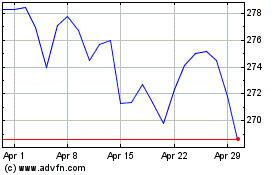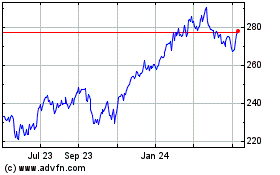Visa to Pay $5.3 Billion For Fintech Startup Plaid -- WSJ
January 14 2020 - 3:02AM
Dow Jones News
By Cara Lombardo and AnnaMaria Andriotis
This article is being republished as part of our daily
reproduction of WSJ.com articles that also appeared in the U.S.
print edition of The Wall Street Journal (January 14, 2020).
Visa Inc. said Monday it would buy Plaid Inc. for $5.3 billion,
as part of an effort by the card giant to tap into consumers'
growing use of financial-technology apps and noncard payments.
More consumers over the past decade have been using
financial-services apps to manage their savings and spending, and
Plaid sits in the middle of those relationships, providing software
that gives the apps access to financial accounts. Venmo, PayPal
Holdings Inc.'s money-transfer service, is one of privately held
Plaid's biggest customers.
Visa is the largest U.S. card network, handling $3.4 trillion of
credit, debit and prepaid-card transactions in the first nine
months of 2019, according to the Nilson Report. Its clients are
largely comprised of banks that issue credit and debit cards, but
the company is looking to expand its presence in the burgeoning
field of electronic payments, where trillions of dollars are sent
by wire transfer or between bank accounts globally each year.
On an investor conference call following the Monday
announcement, Visa Chief Executive Al Kelly said the acquisition
would help expand the company's access to financial-technology
firms while accelerating its movement outside of cards. The deal
was reported earlier Monday by The Wall Street Journal.
Visa last year acquired control of Earthport, which provides
cross-border payment services to banks and businesses, after rival
Mastercard Inc. also made an offer for the company. Before that,
Mastercard bought payment-technology firm Vocalink, which enables
the movement of payments between bank accounts.
These moves are essentially a way for the giant networks to
diversify, preparing for the possibility that noncard-payment forms
could one day replace their cards.
Card networks are concerned that consumer payments could move
away from debit and credit cards to bank accounts, essentially
allowing consumers to pay for products directly out of their bank
accounts while bypassing so-called card rails altogether.
Bank-account payments also offer a way into business-to-business
payments, a sector in which card companies have been trying to play
a bigger role because it is viewed as untapped compared with
consumer payments.
The deal could also help Visa address banks' concerns about
security as more new players like Plaid gain access to their
customers' information. It could boost Plaid's standing with banks
that have been wary of the services it offers and clashed with
fintech firms over their use of Plaid to access bank-customer
account data.
Visa is paying a significant premium over Plaid's valuation of
roughly $2.65 billion in a 2018 funding round, though the purchase
price still represents a rounding error for a company with a market
value of some $420 billion.
Both Visa and Mastercard had invested in Plaid as part of the
$250 million funding round.
Plaid was founded in 2012 by Zach Perret, who is its current
chief executive, and William Hockey. Its other investors include
venture-capital firms Andreessen Horowitz LLC and Kleiner
Perkins.
Write to Cara Lombardo at cara.lombardo@wsj.com and AnnaMaria
Andriotis at annamaria.andriotis@wsj.com
(END) Dow Jones Newswires
January 14, 2020 02:47 ET (07:47 GMT)
Copyright (c) 2020 Dow Jones & Company, Inc.
Visa (NYSE:V)
Historical Stock Chart
From Mar 2024 to Apr 2024

Visa (NYSE:V)
Historical Stock Chart
From Apr 2023 to Apr 2024
